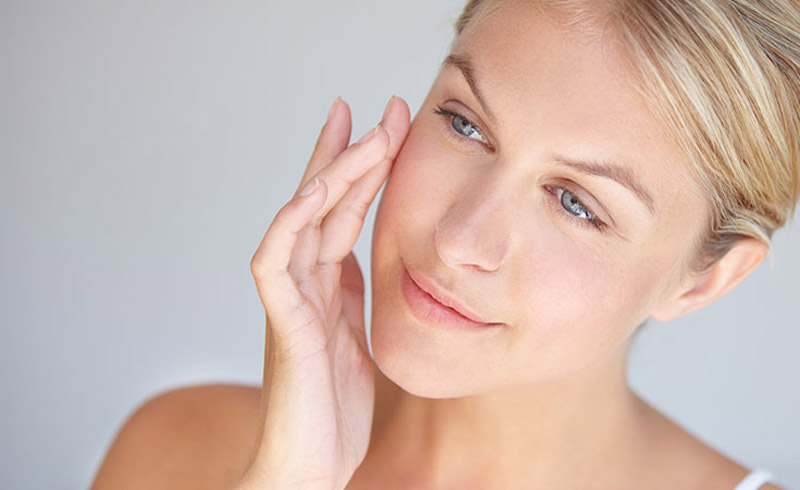
Improving the skin's elasticity, or what accounts for firmness and "bounce," is one of the most effective methods of improving the complexion of your skin. After the age of 25, skin elasticity declines as the levels of the structural proteins that make it up—namely, collagen, elastin, and glycosaminoglycans—drop. According to board-certified dermatologist Gary Goldfaden, M.D., this is because "the amount of new collagen that your skin produces declines while the rate of its destruction increases." He adds that this rate of decline intensifies upon menopause.
The good news is that there are many ways to naturally mitigate this process holistically. Below, you will find 16 natural ways to support skin elasticity by either promoting the presence of structural proteins in the skin or preventing their breakdown:
1.
Retinols or retinol alternatives
There are several topical ingredients to seek out in your skin care that will improve the elasticity of your skin over time, whether via stimulating collagen or preventing the inflammation that leads to the breakdown of structural proteins in the skin. Retinol, a form of vitamin A, is a popular dermatological pick. And for a natural alternative to retinol that will not cause sun sensitivity, try the oil bakuchiol.As board-certified dermatologist Hadley King, M.D., says, "Beyond using sun protection, these are the most proven anti-aging options [which] work by increasing the turnover of cells and collagen production."
2.
Vitamin B3

3.
Vitamin C

4.
Plant-based stem cells
Plant-based stem cells such as raspberry leaf extract, comfrey stem cells, or white tea leaf extract can all help as well. "They essentially act as a massive protective barrier for the skin to allow our cells to regenerate at a healthy speed without being compromised by external factors, including UVA/UVB rays," says Goldfaden.5.
Regular exfoliation
As we age, our skin's natural mechanism for renewal (i.e., cell turnover) decreases. Regular exfoliation does more than simply remove the dead skin cells from the surface of your skin, which can contribute to a saggy-looking, dull appearance. The results of one study that found that six months of topical glycolic acid increased epidermal thickness by 27%.6.
Collagen supplements
Collagen supplements yielded promising results regarding skin elasticity, among other things.* Rather than the collagen peptides traveling through the gut lining and reaching the skin, the thought is that they help support your body's natural production of collagen and other molecules that make up the skin, like elastin and fibrillin.* Collagen can be sourced from animals (like grass-fed bovine collagen) and plants.7.
Stress reduction
"It is important to minimize stress [because] cortisol, the primary stress hormone, has been shown to break down collagen in the skin," says King. "The higher the stress level, the more cortisol is produced, and over time the skin's ability to rebuild the collagen and elastin will decrease," she warns.Naturopathic doctor Nadia Musavvir explains that stress is relative. "Stress is unique to you and what your body perceives as stressful, even if you feel like everything is fine," she says. Stressors may range from the emotional to the physiological, from a relationship to even blood sugar instability.
8.
Exercise

9.
Enjoy a skin-healthy diet
Since we know that inflammation leads to enzymes that cue the breakdown of collagen and elastin, incorporating elements of an anti-inflammatory diet is key. This means incorporating antioxidants, which can be found in berries and fresh, leafy greens, as well as the essential fatty acids found in salmon and almonds.Goldfaden suggests incorporating two other elasticity promoters: probiotics and vitamin D (which is a key factor in skin cell growth, regeneration, protection, and repair) while Musavvir shares that the skin of red organic grapes are an excellent source of resveratrol. Furthermore, glucosamine and curcumin—which is found in the turmeric plant—are known for delivering anti-inflammatory and antioxidant protection.
10.
Avoid inflammation-triggering foods

11.
LED lights
Red and infrared light sources are a noninvasive technique for reducing inflammation and promoting collagen production, penetrating to the fibroblasts in our skin cells—much more deeply than any topical ingredients can reach. "Red light stimulates the mitochondria, the energizers of our cells," says Musavvir. "This stimulates collagen and elastin production, as well as preventing its breakdown."12.
Microneedling

13.
Microcurrent and nanocurrent facials
Microcurrent and nanocurrent facials use gentle, nonpainful electric currents to stimulate the muscles of your face. The celebrity-beloved treatment can be performed by an esthetician and is often compared to a "gym session" for the facial muscles.
14.
Facial massage

15.
Sleep

16.
Hydration

If you are pregnant, breastfeeding, or taking medications, consult with your doctor before starting a supplement routine. It is always optimal to consult with a health care provider when considering what supplements are right for you.
See more at: MindBodyGreen
![[feature] 16 Natural Ways To Support Skin Elasticity — Expert-Approved Tips](https://blogger.googleusercontent.com/img/b/R29vZ2xl/AVvXsEjekOuXCRfVFJ1FLEUwySz9yWhdCajd-cqSwybQEZYOshpcUswPJPZBlmlNrJg0SY-K_Lf6zwhY970FIq4eSN3l8G4UqOezKfRSSV0FP_H13_Bg2GodSu5D-TV14UZJuTtqXpiL-IyX6KV-/s1600/women+1.jpg)























